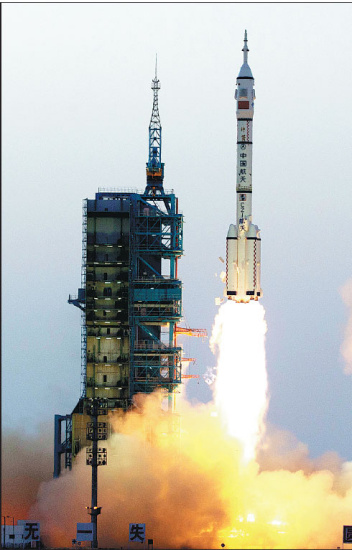
Shenzhou XI, China's sixth manned spacecraft, is sent skyward atop a Long March 2F rocket from the Jiuquan Satellite Launch Center in the northwestern province of Gansu on Oct 17.Feng Yongbin/china Daily
Advanced technology
The cold-atom clock is based on atomic physics, but unlike most atomic clocks, it uses advanced cold-atom technology to ensure it remains ultraprecise.
A mechanical watch loses almost one second a day; a quartz watch loses about one second every 10 days; and a hydrogen atomic clock loses about one second over millions of years. The cold-atom clock exceeds them all in accuracy, according to Liu.
Scientists attribute its accuracy to the microgravity environment in space, as well as the coldness of the atoms it uses.
When pushed by laser beams in microgravity conditions, the frigid atoms move in a straight line simultaneously. By observing their movement, scientists can obtain a more precise atomic clock signal than under Earth's gravity.
Laser-cooling technology helps to eliminate the influence of atomic thermal motion (the random movement of particles caused by heat) on the clock's performance.
"Though molecules and atoms can't be seen in a room, they are actually moving at high speed, and speed is equivalent to temperature," Liu said.
"We use laser-cooling technology to slow down the atoms to a temperature a refrigerator could never reach, so they almost remain motionless. By observing the almost static atoms, we make our measurements more precise."
Scientists believe that putting such a clock into space will help to establish a time standard that will allow more-precise synchronization of other atomic clocks. "A more accurate clock system in space will benefit us on Earth," Liu said, citing possible substantial improvements in navigation and positioning accuracy.
Scientists say the development of cold-atom technology in space could facilitate other advances, such as deep-space navigation and positioning, dark matter probes and even exploration of gravitational waves.
"A lot of research is based on our measurement of time and space. If we could detect subtle changes in time and space, we could make discoveries beyond the range of existing technology," Liu said.


















































